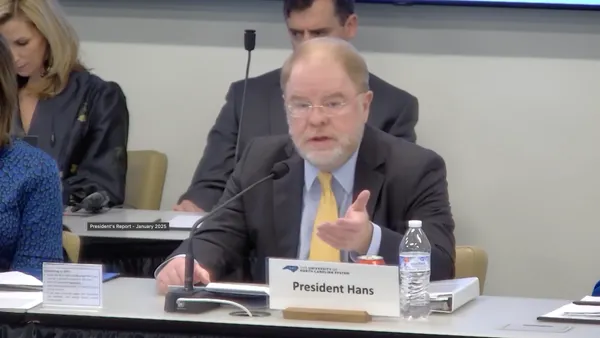Dive Brief:
- West Virginia University will reduce its libraries' personnel budget by up to $800,000 following recommendations from the provost's office. The dean of libraries must submit a plan for the cuts by Dec. 1, and staff will be notified if they have been terminated between Dec. 8 and 15.
- The provost's office also recommended the university's Teaching and Learning Commons — which provides teaching support and resources for faculty, postdoctoral fellows and graduate students — reduce its operations and potentially cut staff over concerns its services are duplicating those in other departments.
- Faculty in affected units were notified about the coming budget cuts on Monday, Stephanie Taylor, WVU’s vice president and general counsel, said during a meeting Wednesday. They must say by Sept. 30 whether they want WVU to consider keeping their positions. Roughly 60% of the group had responded as of Wednesday morning, Taylor said.
Dive Insight:
Last week, WVU's board of governors voted to eliminate 28 degrees and roughly 140 faculty positions in the face of a $45 million budget shortfall. The extensive programming cuts will now be accompanied by rollbacks to academic support services.
The provost's office did not recommend completely discontinuing any academic support units, but it will require a majority of the reviewed departments to submit action plans to address budget concerns and detail growth strategies.
WVU leadership declined to say how many faculty and staff positions could be eliminated under the provost's recommendations.
Of the 19 academic support units reviewed, only the libraries department and the Teaching and Learnings Commons will face cuts. The recommendations would allow 11 units to continue operating at their current levels, but they will need to address concerns from the provost's office.
For example, WVU Online, the university’s online degree and certificate department, is central to the institution's enrollment growth strategy. But it must develop a comprehensive marketing strategy and determine what technology infrastructure is needed to support online enrollment growth.
The remaining six units, which include the LGBTQ+ and Women’s Resource centers, as well as the Center for Veterans, Military and Family Programs, have not been affected.
The libraries department’s operating budget has already been reduced over the last couple of years, according to Mark Gavin, WVU's associate provost for academic, budget, facilities and strategic initiatives. But the provost's office questioned the libraries' staffing levels despite a "voluminous" number of positive comments collected from students, faculty and staff in a stakeholder survey.
"Under its current structure, saving $800,000 from its personnel roster would be rather debilitating," Gavin said during a presentation Wednesday. "But through restructuring efforts, the dean of the libraries, Karen Diaz, is confident that she can realize these savings without negatively impacting service levels for students, faculty and staff."
The department's materials budget will be unaffected.
The Teaching and Learning Commons, known as TLC, also received generally positive feedback from stakeholders. But some expressed concerns that it duplicated services offered elsewhere on campus, Gavin said.
By the end of October, TLC must transfer oversight of classroom technology, microcredentialing, badging, Zoom and other responsibilities to designated departments. It will also need to recommend whether to cut the number of technologists, instructional designers and multimedia specialists it has.
"In no way does this reflect negatively on the TLC, but it does offer the opportunity for change," he said. "More specifically, we have the opportunity to narrow TLC's focus to the primary mission of developing, supporting and facilitating effective teaching, and course delivery across modes of instruction."
TLC's leadership must deliver a revised mission plan to the provost's office by Nov. 17.
The recommendations are not governed by WVU's board and cannot be appealed.
The Institutional Research Unit's recommendations are still pending because the department was heavily involved in gathering data during the review of WVU’s academic programming. Its results are expected in the next couple of weeks, Gavin said.
WVU officials will determine which faculty and staff will be laid off or whose contracts won’t be renewed. The committee will weigh faculty members' performance history, qualifications and seniority in a blind review process.
Eliminated employees will be notified by Oct. 16. Due process hearings for tenured and tenure-track faculty will be later that month.












